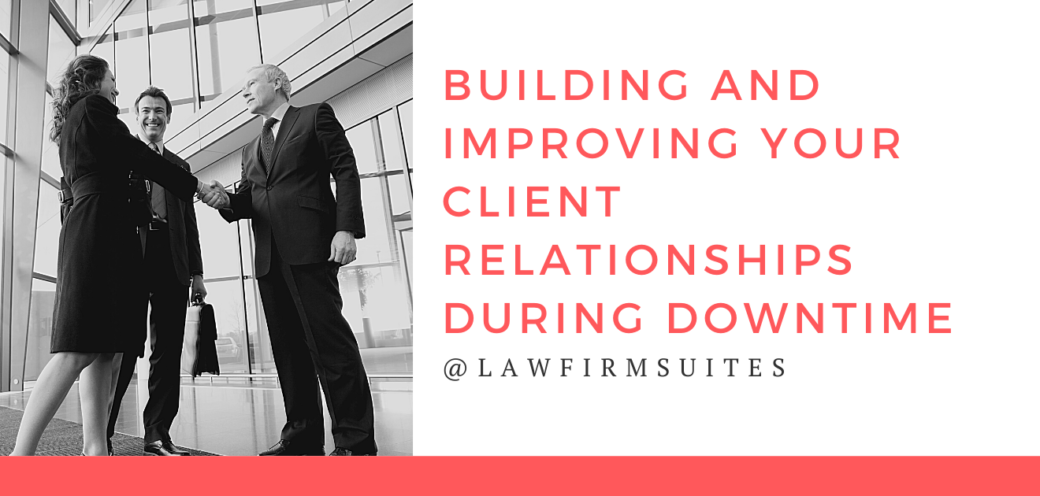Even if your practice has temporarily slowed down, continue to improve relationships with current clients, and build new ones too.
Right now there are countless law firms that are slowing down their operations while we all work through this new COVID-19 world. It’s a frustrating time for solo and small law firm lawyers that until recently had big plans for this year, but that doesn’t mean everything has to stop for your practice. There is some very important work you can keep doing even if your doors aren’t wide open. For example, now is the perfect time to focus on building and improving your client relationships.
Though your operations may be shut down for the short term, you can’t stop building relationships with current clients or seeking out relationships with new ones. How you treat your clients (especially right now!) will become a defining part of your reputation and will impact your practice for years to come. Here are three steps that you can take today to get the ball rolling.
1. Start with a revisit and review of past conversations
With this newly found free time, now is a great time to revisit and review the ways you do things. Specifically, take a look at the history of messages (emails, texts, phone calls, in-person meetings) you’ve had with your past and current clients. Go through everything and take a serious look at how you’ve presented yourself so far.
- Are you setting the right tone from the beginning?
- Are you setting the rules and expectations for the relationship?
- Did you emphasize how and when your clients should hear from you?
- Do you seem knowledgeable?
- Did you respond in a timely manner?
If you don’t like what you find or if something doesn’t line up with your standards or goals, start developing a new client communication policy that you (or one of your staff members!) can start using right away. Then also be sure to record and measure the statistics you set, that way you can track improvements too.
2. Personal check-in
It’s very easy for a potential client to fall out of communication, even more during the current state of the world. This doesn’t always mean you’re being ignored or that they’re no longer interested. Odds are that their priorities have been (rightly) rearranged.
You won’t cross a line by sending them a personal note, email or call, but it should be the right kind of message. Now is not the time to put any pressure on clients to make decisions. Instead now is the time to reach out with a message of empathy and concern. To make sure that they are okay and doing so as a friend, not their lawyer.
In some cases, especially if you haven’t developed a strong rapport, your potential clients might not be to keen on responding. And that’s fine! Respect their decision, and don’t pester them with more emails. Some of the clients you contact will be ready to share their situations, and might even be ready to continue the conversation towards becoming a paying client.
These clients may represent your only reliable business for a while. And even those that don’t sign up right now, the fact that you reached out and cared enough to ask how they were doing might be the difference between them hiring you over your competition after this is all over.
3. Consider the effect of accommodations
In most law practices, a lot of decisions are on a case-by-case basis. No two situations are identical and most are custom built to some extent, and that can make it easier to find ways to tailor a project to a client.
For any business, accommodating each client can quickly get complicated. That’s why it’s important to plan ahead when it comes to making accommodations. Have a plan so if this conversation comes up you’ll be ready with options. If you get the same feedback from a lot of clients and everyone is asking for accommodations then you can implement some of those changes permanently.
Depending on the client, it may be valuable for you to consider cutting some costs on your end. If you can come to an agreement, you can commit to a client before you (or your team) is fully back in the office working full time. That way, you can keep your business moving and you’ll be ready to hit the ground running as soon as possible.
Conclusion
Using these tips, you can continue to build and improve your relationships with both current and potential clients alike. Review how you’ve done things in the past, reach out and check in on them, and be open to the idea that some may need accommodations in order to get their business.


